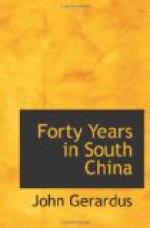“In consequence of such division the native Churches will not be so able to support the Gospel among themselves. Look at the condition of our Western towns in this respect. Why strive to entail like evils on our missionary churches? ....
“But may not the Church change or improve her decisions? Here is one of the good things we hope to see come out of this mistake of the Church. Jesus rules, and He is ordering all things for the welfare of His Church and the advancement of His cause. Sometimes, the better to accomplish this end, He permits the Church to make mistakes. When we failed in former days to get our views made public, it gave us no anxiety, for we believed the doctrine that Jesus reigns. So we now feel, notwithstanding this mistake. The Master will overrule it for good. We do not certainly know how, but we can imagine one way. By means of this mistake the matter may be brought before our Church, and before other Churches, more clearly than it would otherwise have been for many years to come, and in consequence of this we expect, in due time, that our Church, instead of coming up merely to the standard of liberality for which we have been contending, will rise far above anything we have asked for or even imagined, and other Churches will also raise their standard higher. Hereafter we expect to contend for still higher principles. This is the doctrine. Let all the branches of the great Presbyterian family in the same region in any heathen country, which are sound in the faith, organize themselves, if convenient, into one organic whole, allowing liberty to the different parts in things non-essential. Let those who adopt Dutch customs, as at Amoy, continue, if they see fit, their peculiarities, and those who adopt other Presbyterian customs, as at Ningpo and other places, continue their peculiarities, and yet all unite as one Church. This subject does not relate simply to the interests of the Church at Amoy. It relates to the interests of all the missionary work of all the churches of the Presbyterian order in all parts of the world. Oh, that our Church might take the lead in this catholicity of spirit, instead of falling back in the opposite direction-that no one may take her crown! But if she do not, then we trust some other of the sacramental hosts will take the lead and receive, too, the honor, for it is for the glory of the great Captain of our salvation and for the interests of His kingdom. We need the united strength of all these branches of Zion for the great work which the Master has set before us in calling on us to evangelize the world. In expecting to obtain this union, will it be said that we are looking for a chimera? It ought to be so, ought it not? Then it is no chimera. It may take time for the Churches to come up to this standard, but within a few years we have seen tendencies to union among different branches of the Presbyterian family in Australia. In Canada, in our own country, and in England and Scotland. In many places these tendencies are stronger now than they have ever before been since the days of the Reformation.




